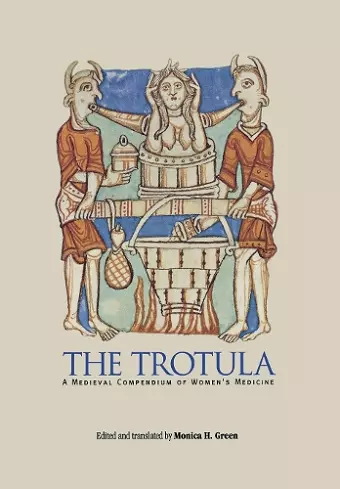The Trotula
A Medieval Compendium of Women's Medicine
Format:Hardback
Publisher:University of Pennsylvania Press
Published:16th Apr '01
Currently unavailable, and unfortunately no date known when it will be back

"This long-awaited book makes available . . . the most important collection of material on women's diseases and their treatments for the period from the twelfth to the fifteenth centuries."—Social History of Medicine
"This long-awaited book makes available ... the most important collection of material on women's diseases and their treatments for the period from the twelfth to the fifteenth centuries."-Social History of Medicine
The Trotula was the most influential compendium on women's medicine in medieval Europe. Scholarly debate has long focused on the traditional attribution of the work to the mysterious Trotula, said to have been the first female professor of medicine in eleventh- or twelfth-century Salerno, just south of Naples, then the leading center of medical learning in Europe. Yet as Monica H. Green reveals in her introduction to this first edition of the Latin text since the sixteenth century, and the first English translation of the book ever based upon a medieval form of the text, the Trotula is not a single treatise but an ensemble of three independent works, each by a different author. To varying degrees, these three works reflect the synthesis of indigenous practices of southern Italians with the new theories, practices, and medicinal substances coming out of the Arabic world.
Arguing that these texts can be understood only within the intellectual and social context that produced them, Green analyzes them against the background of historical gynecological literature as well as current knowledge about women's lives in twelfth-century southern Italy. She examines the history and composition of the three works and introduces the reader to the medical culture of medieval Salerno from which they emerged. Among her findings is that the second of the three texts, "On the Treatments for Women," does derive from the work of a Salernitan woman healer named Trota. However, the other two texts—"On the Conditions of Women" and "On Women's Cosmetics"—are probably of male authorship, a fact indicating the complex gender relations surrounding the production and use of knowledge about the female body.
Through an exhaustive study of the extant manuscripts of the Trotula, Green presents a critical edition of the so-called standardized Trotula ensemble, a composite form of the texts that was produced in the mid-thirteenth century and circulated widely in learned circles. The facing-page complete English translation makes the work accessible to a broad audience of readers interested in medieval history, women's studies, and premodern systems of medical thought and practice.
"Specialists and more general readers will find here rigorous and satisfying answers to questions about medieval medicine, women's health, women's learning and practical traditions, and about the convergence of classical, Arabic, and local knowledge." * Joan Cadden, University of California, Davis *
"This is the definitive Trotula, a new edition of which will not be necessary. . . . This book will be useful to historians of medicine, of women's studies, of medieval culture, and of southern Italy, and to graduate, and even undergraduate students interested in grappling with the actual practice of medieval medicine." * The Medieval Review *
"Thanks to Monica H. Green's splendid new critical edition and translation . . . one of the toughest nuts of medieval medical learning has been cracked. . . . The introduction and translation are spirited and readable; both could be profitably assigned to undergraduates and would provide an excellent entry not only into medieval women's medicine but also into the rich worlds of medical practice and textual transmission." * Speculum *
"This long-awaited book makes available an English translation of a set of texts which, in its various versions, both in Latin and in translations into many western European vernacular languages, represents the most important collection of material on women's diseases and their treatments for the period from the twelfth to the fifteenth centuries." * Social History of Medicine *
"The Trotula: A Medieval Compendium of Women's Medicine furnishes students and scholars with an invaluable reference. Backed by more than twenty years of scrupulous research and publication, as well as an insightful methodology, it also provides them with an object of inspiration. Green's work is a remarkable example of scholarship." * Comitatus *
ISBN: 9780812235890
Dimensions: unknown
Weight: unknown
320 pages